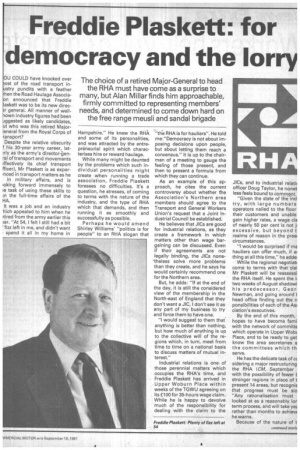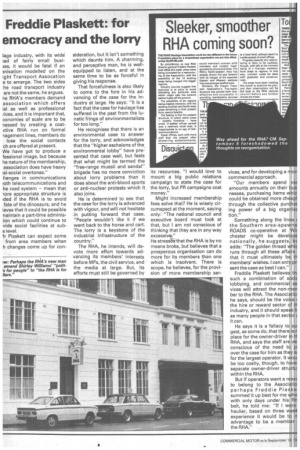Freddie Plaskett: for democracy and the lorry
Page 15

Page 16

If you've noticed an error in this article please click here to report it so we can fix it.
The choice of a retired Major-General to head the RHA must have come as a surprise to many, but Alan Millar finds him approachable, firmly committed to representing members' needs, and determined to come down hard on the free range meusli and sandal brigade
OU COULD have knocked over ost of the road transport inustry pundits with a feather hen the Road Haulage Associan announced that Freddie laskett was to be its new direcr general. All manner of wellown industry figures had been uggested as likely candidates, ut who was this retired Majorieneral from the Royal Corps of ran sport?
Despite the relative obscurity f his 30-year army career, latKly as the army's director-enral of transport and movements ffectively its chief transport fficer), Mr Plaskett is as exper,nced in transport matters as he
in military affairs, and is loking forward immensely to le task of using these skills to in the full-time affairs of the HA.
It was a job and an industry hich appealed to him when he !tired from the army earlier this )ar. "At 54, I felt I still had a bit fizz left in me, and didn't want spend it all in my home in
Hampshire." He knew the RHA. and some of its personalities, and was attracted by the entrepreneurial spirit which characterises hire or reward haulage.
While many might be daunted by the problems which such individual personalities might create when running a trade association, Freddie Plaskett foresees no difficulties. It's a question, he stresses, of coming to terms with the nature of the industry, and the type of RHA which that demands, and then running it as smoothly and successfully as possible.
Perhaps he would amend Shirley Williams' "politics is for people" to an RHA slogan that the RHA is for hauliers". He told me:"Democracy is not about imposing decisions upon people, but about letting them reach a concensus." It is up to the chairman of a meeting to gauge the feeling of those present, and then to present a formula from which they can continue.
As an example of this approach, he cites the current controversy about whether the Association's Northern area members should agree to the Transport and General Workers Union's request that a Joint Industrial Council be established.
He believes that JICs are good for industrial relations, as they create a framework in which matters other than wage bargaining can be discussed. Even if their agreements are not legally binding, the JICs none'theless solve more problems than they create, and he says he would certainly recommend one for the Northern area.
But, he adds: "If at the end of the day, it is still the considered view of the membership in the North-east of England that they don't want a JIC, I don't see it as any part of my business to try and force them to have one.
"I would suggest to them that anything is better than nothing, but how much of anything is up to the collective will of the regions which, in turn, meet from time to time on a national basis to discuss matters of mutual interest."
Industrial relations is one of those perennial matters which occupies the RNA's time, and Freddie Plaskett has arrived in Upper Woburn Place within weeks of the TGWU agreeing on its £100 for 35-hours wage claim. While he is happy to devolve much of the responsibility for dealing with the claim to the JICs, and to industrial relati( officer Doug Taylor, he nonet less feels bound to comment. "Given the state of the ind try, with large numbers operators nailed to the floor their customers and unable gain higher rates, a wage cla of nearly 50 per cent is not ji excessive, but beyond t realms of reason in the [mese circumstances.
"I would be surprised if ma hauliers can offer much, if ai thing at all this time," he adde,
While the regional negotiate come to terms with that clai Mr Plaskett will be reassessi the RHA itself. He spent the I. two weeks of August shadowi his predecessor, Geor Newman, and going around t head office finding out the n ponsibilities of each of the As ciation's executives.
By the end of this month, hopes to have become fami with the network of cornmittE which operate in Upper Wobc Place, and to be ready to get know the area secretaries a the committees which th serve.
He has the delicate task of cc sidering a major restructuring the RHA (CM, September with the possibility of fewer t stronger regions in place of t present 14 areas, but recognis that progress must be slo "Any rationalisation must looked at as a reasonably lor term process, and will take yeE rather than months to achiew he warns.
Because of the nature of t lege industry, with its wide :ad of fairly small busies, it would be fatal if an nisation modelled on the ight Transport Assocation e to emerge. The two sides :he road transport industry are not the same, he argues. he RHA's members demand association which offers ial as well as professional /ices, and it is important that, conomies of scale are to be hessed by creating a costctive RHA run on formal lagement lines, members do lose the social contacts ch are offered at present.
We have got to produce a fessional image, but because he nature of the membership, association does have heavy isi-social overtones."
hanges in communications 4oth telecommunications and he road system — mean that lore appropriate structure is tied if the RHA is to avoid fate of the dinosaurs, and he ieves that it could be possible riaintain a part-time adminision which could continue to vide social facilities at suba level.
1r Plaskett can expect some from area members when h changes come up for con sideration, but it isn't something which daunts him. A charming, and perceptive man, he is wellequipped to listen, and at the same time to be as forceful in giving his response.
That forcefulness is also likely to come to the fore in his advancing of the case for the industry at large. He says: "It is a fact that the case for haulage has suffered in the past from the lunatic fringe of environmentalists for too long."
He recognises that there is an environmental case to answer for the lorry, and acknowledges that the "higher eschelons of the environmental lobby" have presented that case well, but feels that what might be termed the "free-range muesli and sandal" brigade has no more conviction about lorry problems than it does about the anti-blood sports or anti-nuclear protests which it also joins.
He is determined to see that the case for the lorry is advanced with vigour, and will not hesitate in putting forward that case. "People wouldn't like it if we went back to the horse and cart. The lorry is a keystone of the industrial infrastructure of the country."
The RHA, he intends, will devote more effort towards advancing its members' interests before MPs, the civil service, and the media at large. But, its efforts must still be governed by its resources. "I would love to mount a big public relations campaign to state the case for the lorry, but PR campaigns cost money."
Might increased membership fees solve that? He is wisely circumspect at the moment, saying only: "The national council and executive board must look at that, but I am not conscious of thinking that they are in any way excessive."
He stresibs that the RHA is by no means broke, but believes that a prosperous organisation can do more for its members than one which is insolvent. There is scope, he believes, for the provision of more membership ser vices, and for developing a mon commercial approach.
"Our members spend vat amounts annually on their bus nesses, purchasing items whic could be obtained more cheapi through the collective purchae ing power of a big organise tion."
Something along the lines ( the Southern area-spawne ROADS co-operative at Wit chester might be develope nationally, he suggests, IN. adds: "The golden thread whic runs through all these affairs that it must ultimately be th members' wishes. I can only pri sent the case as best I can."
Freddie Plaskett believes th. such a combination of socie lobbying, and commercial se vices will attract the non-men ber to the RHA. The Associatio he says, should be the voice 4 the hire or reward sector of industry, and it should speak f( as many people in that sector t it can.
He says it is a fallacy to sui gest, as some do, that there is r place for the owner-driver in RHA, and says the staff are ve conscious of the need to pi over the case for him as they a for the largest operator. It wou be too costly, though, to have separate owner-driver structu within the RHA.
But if operators want a reasc to belong to the Associatio perhaps Freddie Plaske summed it up best for me whe with only days under his RH belt, he told me: "If I were haulier, based on three week experience it would be to n advantage to be a member the RHA."








































































